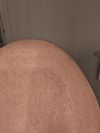community 7 months of Dutasteride 1mg daily and 2.5-5mg oral minoxidil daily on Diffused Unpatterned Alopecia
A user shared their 7-month progress using 1mg daily Dutasteride and 2.5-5mg daily oral Minoxidil for diffuse unpatterned alopecia, showing significant hair regrowth with reduced shedding and no side effects. They experienced a severe initial shed but now have visual improvement, despite hair still being thinner than before.
